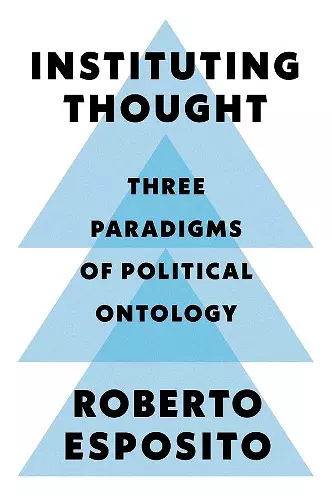Instituting Thought
Three Paradigms of Political Ontology
Roberto Esposito author Mark Epstein translator
Format:Hardback
Publisher:John Wiley and Sons Ltd
Published:30th Jul '21
Currently unavailable, and unfortunately no date known when it will be back
This hardback is available in another edition too:
- Paperback£18.99(9781509546435)

This new book by the Italian philosopher Roberto Esposito addresses the profound crisis of contemporary politics and examines some of the philosophical approaches that have been used to try to understand and go beyond this crisis. Two approaches have been particularly influential – one indebted to the thought of Martin Heidegger, the other indebted to Gilles Deleuze. While opposed in their political thrust and orientation, both approaches remain trapped within the political ontology that has framed our conceptual language for some time.
In order to move beyond this political ontology, Esposito turns to a third approach that he characterizes as ‘instituting thought’. Indebted to the work of the French political philosopher Claude Lefort, this third approach recognizes that the road to reconstructing a productive relation between ontology and politics, one that is both realistic and innovative, lies in instituting praxis. Building on this insight, Esposito conceptualizes social being as neither univocal nor plurivocal but as cross-cut by the dual semantics of political conflict.
This new book by one of the most original European philosophers writing today will be of great interest to students and scholars in philosophy, social and political theory and the humanities generally.“In a moment of rampaging populism and political stress tests of democracy, Roberto Esposito’s Instituting Thought offers a way forward toward the renewal of politics by reimagining the political. That his reading begins and ends with Machiavelli is only one of the many surprises in store for the reader in Esposito’s attempt to move past political theology toward a more affirmative configuration of political ontology. Esposito leaves behind Heidegger and Deleuze in favor of Machiavelli and of Claude Lefort’s nuanced reading of institutions and, in the process, sets out a manifesto for institutions and subjectivation in the wake of biopolitcal devastation and political nihilism. This is his most important work since Bios.”
Tim Campbell, Cornell University
ISBN: 9781509546428
Dimensions: 229mm x 158mm x 25mm
Weight: 476g
264 pages